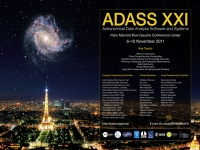Key Topics
- GPUs in Astronomy and Beyond - Graphics processing unit (GPUs) have emerged in the recent years as a powerful and cost-effective platform for high performance parallel computing. This session is a platform for the projects currenty taking advantage of GPU architectures and for discussing applications in astronomy.
- Cloud Computing and Virtualization - Cloud computing and virtualization offer great opportunities for optimizing the use of computing resources, and provide solutions to cope with the growing requirements complexity and the operational challenges of modern astronomy projects.
- Statistical Data Analysis and Knowledge Discovery - Algorithmic developments, statistical modeling, data mining, and new ways to extract information and knowledge from astronomical data sets are the main topics of this session.
- Planning, Scheduling, and Operating Observatories - Efficient operations at large observatories requires state-of-the-art planning and scheduling solutions, and a continuous improvement of the operation models. This session discusses the challenges faced by large observatories, the lessons learned, and future challenges envisioned for the next generation of large observatories.
- Solar Astronomy - Solar Astronomy and solar physics are two branches of science that observe and study the Sun and attempt to explain and predict its behavior. This includes the study of solar events such as solar flares and coronal mass ejections (CME) that can effect the Earth and it magnetosphere, and measurement, causes, effects, and prediction of these events. This session discusses the current solar observatories, future observatories, and the science and algorithms that support solar science.
- Virtual Observatory - This session is the platform for presenting Virtual Observatory (VO) projects and initiatives, and to discuss new ways of exploiting the data provided by the ever-growing number of ground-based and space facilities.
- Long Term Preservation of Analysis Capabilities in Astronomy Software - Software and data analysis capabilities for astronomical community often needs to be maintained for many decades. This session discusses the challenges faced by the astronomical community for the preservation of the data, the software, and the relevant knowledge on how to use them.
Latest News
- Online proceedings have been published by the ASP (2012)
- Deadline for final update of the manuscripts (25 Nov. 2011) has passed. Upload your file (XXX_v2.tar.gz) to the ftp server.
- Oral presentation slides are linked from the corresponding abstracts (23 Nov.)
- Authors and manuscript preparation instructions have been released (6 October)
- The Conference Schedule has been released (30 September)
- The Poster table has been updated (16 September)
- Registration is open (5 July)
- Previous Announcements
Quick links
Download the Official Conference Flyer:
PDF (with printer marks):

